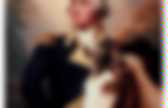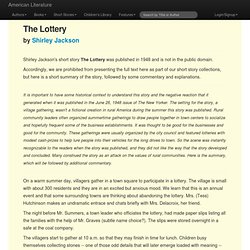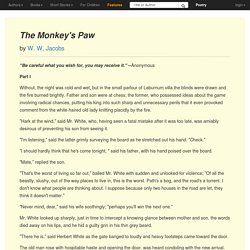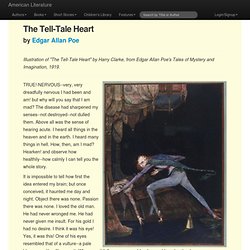

The Eclipse. By James Fenimore Cooper THE eclipse of the sun, which you have requested me to describe, occurred in the summer of 1806, on Monday, the 16th of June.

The Lottery. By Shirley Jackson Shirley Jackson's short story The Lottery was published in 1948 and is not in the public domain.

Accordingly, we are prohibited from presenting the full text here as part of our short story collections, but here is a short summary of the story, followed by some commentary and explanations. It is important to have some historical context to understand this story and the negative reaction that it generated when it was published in the June 26, 1948 issue of The New Yorker. The setting for the story, a village gathering, wasn't a fictional creation in rural America during the summer this story was published. Rural community leaders often organized summertime gatherings to draw people together in town centers to socialize and hopefully frequent some of the business establishments. On a warm summer day, villagers gather in a town square to participate in a lottery. The night before Mr. The villagers start to gather at 10 a.m. so that they may finish in time for lunch.
The Cask of Amontillado. By Edgar Allan Poe The Cask of Amontillado and the accompanying illustration by Harry Clarke were published in 1919 in Edgar Allan Poe'sTales of Mystery and Imagination.

THE thousand injuries of Fortunato I had borne as I best could, but when he ventured upon insult I vowed revenge. You, who so well know the nature of my soul, will not suppose, however, that gave utterance to a threat. At length I would be avenged; this was a point definitely, settled --but the very definitiveness with which it was resolved precluded the idea of risk. I must not only punish but punish with impunity. It must be understood that neither by word nor deed had I given Fortunato cause to doubt my good will. He had a weak point --this Fortunato --although in other regards he was a man to be respected and even feared. It was about dusk, one evening during the supreme madness of the carnival season, that I encountered my friend. I said to him --"My dear Fortunato, you are luckily met. "How? " "Amontillado! " "Ugh! The Monkey's Paw. By W.

W. Jacobs "Be careful what you wish for, you may receive it. " --Anonymous Part I Without, the night was cold and wet, but in the small parlour of Laburnum villa the blinds were drawn and the fire burned brightly. "Hark at the wind," said Mr. "I'm listening," said the latter grimly surveying the board as he stretched out his hand. "I should hardly think that he's come tonight, " said his father, with his hand poised over the board.
"Mate," replied the son. "That's the worst of living so far out," balled Mr. "Never mind, dear," said his wife soothingly; "perhaps you'll win the next one. " Mr. "There he is," said Herbert White as the gate banged to loudly and heavy footsteps came toward the door. The old man rose with hospitable haste and opening the door, was heard condoling with the new arrival.
"Sargeant-Major Morris, " he said, introducing him. "Twenty-one years of it," said Mr. "He don't look to have taken much harm. " said Mrs. The Tell Tale Heart. By Edgar Allan Poe Illustration of "The Tell-Tale Heart" by Harry Clarke, from Edgar Allan Poe's Tales of Mystery and Imagination, 1919.

TRUE! -NERVOUS--very, very dreadfully nervous I had been and am! But why will you say that I am mad? The disease had sharpened my senses--not destroyed--not dulled them. It is impossible to tell how first the idea entered my brain; but once conceived, it haunted me day and night. Now this is the point. I was never kinder to the old man than during the whole week before I killed him.
Upon the eighth night I was more than usually cautious in opening the door. I had my head in, and was about to open the lantern, when my thumb slipped upon the tin fastening, and the old man sprang up in bed, crying out: "Who's there? " I kept quite still and said nothing. Presently I heard a slight groan, and I knew it was the groan of mortal terror.
It was open--wide, wide open--and I grew furious as I gazed upon it. But even yet I refrained and kept still. "Villains! "